九年级英语第六单元笔记
九年级英语unit6知识点梳理

九年级英语unit6知识点梳理Unit 6 知识点梳理在九年级英语学习的过程中,我们要重点掌握Unit 6的相关知识点,这将有助于我们更好地理解和运用英语。
本文将对Unit 6中的各个知识点进行梳理,帮助大家建立全面的知识体系。
一、动词的时态在Unit 6中,我们学习了一些新的动词时态,如一般将来时(The Future Simple Tense)、过去进行时(The Past Continuous Tense)等。
这些新的时态为我们表达不同的时间概念提供了更多的可能性。
在学习过程中,我们需要掌握这些时态的构成和用法,并能灵活运用到实际语境中。
二、情态动词的用法在本单元中,我们还学习了一些情态动词,如can, could, may, might等。
情态动词用于表示能力、可能性、请求、建议等,在日常生活中经常会用到。
在使用情态动词时,我们需要根据具体的语境确定使用哪个情态动词,同时要注意情态动词的变化形式和用法。
三、非谓语动词除了时态和情态动词,本单元还介绍了非谓语动词的用法,包括不定式、动名词和现在分词等。
非谓语动词在句子中可以充当名词、形容词或者副词,使句子结构更加丰富。
我们需要掌握非谓语动词的构成和用法,并能在写作和阅读中准确地使用它们。
四、名词性从句名词性从句是英语中的一个重要知识点。
在本单元中,我们学习了名词性从句的三种类型:主语从句、宾语从句和表语从句。
名词性从句在句子中充当名词的角色,能够起到连接主从句的作用。
我们需要学会分辨和使用名词性从句,并能够根据具体的语境正确地运用它们。
五、冠词的用法冠词在英语中是一个重要的语法项目。
在Unit 6中,我们对定冠词(the)和不定冠词(a, an)进行了复习和扩展。
冠词的正确使用可以帮助我们准确表达自己的意思,同时也能够在阅读理解中帮助我们理解句子的含义。
因此,我们需要掌握不同场合下冠词的用法,并能够在实际运用中正确使用它们。
总之,Unit 6中的各个知识点对我们的英语学习都非常重要。
人教版英语初三第六单元知识点总结
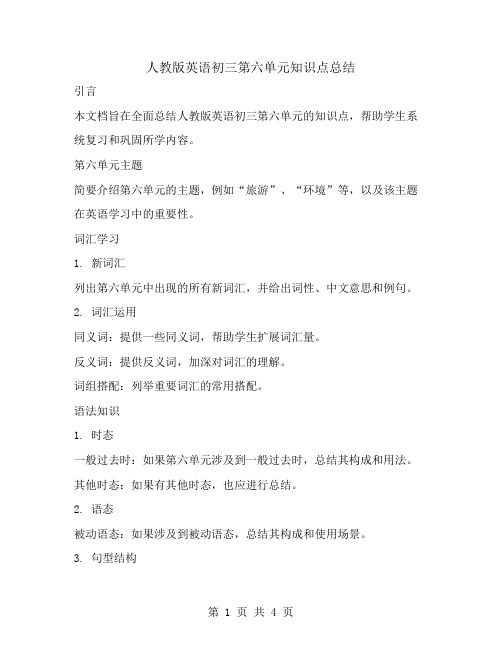
人教版英语初三第六单元知识点总结引言本文档旨在全面总结人教版英语初三第六单元的知识点,帮助学生系统复习和巩固所学内容。
第六单元主题简要介绍第六单元的主题,例如“旅游”、“环境”等,以及该主题在英语学习中的重要性。
词汇学习1. 新词汇列出第六单元中出现的所有新词汇,并给出词性、中文意思和例句。
2. 词汇运用同义词:提供一些同义词,帮助学生扩展词汇量。
反义词:提供反义词,加深对词汇的理解。
词组搭配:列举重要词汇的常用搭配。
语法知识1. 时态一般过去时:如果第六单元涉及到一般过去时,总结其构成和用法。
其他时态:如果有其他时态,也应进行总结。
2. 语态被动语态:如果涉及到被动语态,总结其构成和使用场景。
3. 句型结构简单句:总结简单句的基本结构。
并列句:介绍并列句的构成和使用。
复合句:详细讲解复合句的类型和连接词的使用。
4. 语法点宾语从句:如果单元中有宾语从句,总结其用法。
定语从句:介绍定语从句的构成和用法。
状语从句:总结状语从句的种类和使用。
阅读理解1. 阅读技巧快速阅读:介绍快速阅读技巧,如扫读和略读。
精读:讲解如何进行深入理解和分析。
2. 文章结构开头:分析文章开头的常见方式。
主体:总结主体段落的结构和特点。
结尾:讲解如何写出有力的结尾。
3. 题型分析主旨大意题:介绍如何解答主旨大意题。
细节理解题:讲解细节理解题的解题技巧。
推理判断题:总结推理判断题的答题方法。
写作技巧1. 写作结构引言:介绍如何写好文章的引言部分。
正文:讲解正文的段落结构和论点展开。
结尾:总结如何写出有力的结尾。
2. 写作技巧词汇运用:强调准确使用词汇的重要性。
句型变化:介绍如何使用不同的句型使文章更丰富。
逻辑连贯:讲解如何使文章内容逻辑连贯。
听力训练1. 听力技巧预测:介绍如何根据上下文进行预测。
捕捉关键信息:讲解如何快速捕捉对话或文章中的关键信息。
2. 听力题型选择题:总结选择题的解题策略。
填空题:介绍填空题的答题技巧。
口语表达1. 发音练习元音:总结元音的正确发音方法。
九年级英语下册第六单元单词笔记
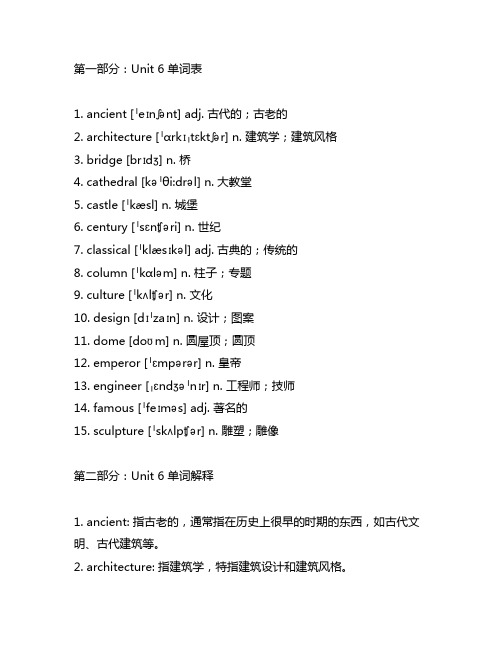
第一部分:Unit 6 单词表1. ancient [ˈeɪnʃənt] adj. 古代的;古老的2. architecture [ˈɑrkɪˌtɛktʃər] n. 建筑学;建筑风格3. bridge [brɪdʒ] n. 桥4. cathedral [kəˈθi:drəl] n. 大教堂5. castle [ˈkæsl] n. 城堡6. century [ˈsɛnʧəri] n. 世纪7. classical [ˈklæsɪkəl] adj. 古典的;传统的8. column [ˈkɑləm] n. 柱子;专题9. culture [ˈkʌlʧər] n. 文化10. design [dɪˈzaɪn] n. 设计;图案11. dome [doʊm] n. 圆屋顶;圆顶12. emperor [ˈɛmpərər] n. 皇帝13. engineer [ˌɛndʒəˈnɪr] n. 工程师;技师14. famous [ˈfeɪməs] adj. 著名的15. sculpture [ˈskʌlpʧər] n. 雕塑;雕像第二部分:Unit 6 单词解释1. ancient: 指古老的,通常指在历史上很早的时期的东西,如古代文明、古代建筑等。
2. architecture: 指建筑学,特指建筑设计和建筑风格。
3. bridge: 指桥,建筑物,用来连接两个地点,通常横跨河流或道路。
4. cathedral: 指大教堂,基督教的大型宗教建筑。
5. castle: 指城堡,一种古老的军事建筑,通常为贵族或国王所建。
6. century: 指世纪,指历法上的百年为一个单位。
7. classical: 指古典的,通常指某种艺术或文化形式,如古典音乐、古典文学等。
8. column: 指柱子,建筑物中用来支撑建筑物的纵向结构。
9. culture: 指文化,包括社会习俗、文学艺术、宗教信仰等。
九年级英语u6知识点总结

九年级英语u6知识点总结In unit 6, we have learned a lot about sports and health. Let's summarize the main points and vocabulary we have learned in this unit.Exercise and Physical ActivitiesIn this unit, we have learned about different forms of exercise and physical activities that contribute to a healthy lifestyle. This includes activities such as running, swimming, cycling, yoga, and playing sports like basketball and volleyball. It is important for us to engage in regular physical activities to keep our bodies healthy and fit. Regular exercise helps improve our cardiovascular health, strengthens our muscles, and increases our flexibility.Vocabulary related to exercise and physical activities:- Jogging- Running- Swimming- Cycling- Yoga- Basketball- Volleyball- Soccer- Tennis- Gymnastics- Aerobics- Flexibility- Endurance- Cardiovascular healthHealthy Eating HabitsIn this unit, we have also learned about the importance of healthy eating habits for maintaining good health. A balanced diet with the right proportion of nutrients, such as carbohydrates, proteins, fats, vitamins, and minerals, is essential for a healthy body. We have learned about the importance of consuming fruits, vegetables, whole grains, lean meats, and dairy products as part of a balanced diet. It is also important to limit the intakeof processed foods and sugary drinks, which can contribute to obesity and other health issues.Vocabulary related to healthy eating habits:- Balanced diet- Nutrients- Carbohydrates- Proteins- Fats- Vitamins- Minerals- Fruits- Vegetables- Whole grains- Lean meats- Dairy products- Processed foods- Sugary drinks- Obesity- Health issuesKeeping Fit and HealthyWe have also learned about the importance of keeping fit and healthy through regular exercise and proper nutrition. Engaging in physical activities and sports helps us maintain a healthy weight, increase our energy levels, and reduce the risk of chronic diseases such as diabetes, heart disease, and high blood pressure. In addition to regular exercise, we have learned about the benefits of staying hydrated, getting enough sleep, and managing stress to maintain overall health and well-being.Vocabulary related to keeping fit and healthy:- Healthy weight- Energy levels- Chronic diseases- Diabetes- Heart disease- High blood pressure- Hydration- Sleep- Stress management- Overall health- Well-beingCommon Sports and Fitness ActivitiesIn this unit, we have also learned about some common sports and fitness activities that people around the world engage in. These activities include running marathons, participating in team sports such as soccer and basketball, and practicing yoga for both physical and mental well-being. We have also learned about the importance of warming up before exercise and cooling down after exercise to prevent injuries and improve performance.Vocabulary related to common sports and fitness activities:- Marathons- Team sports- Soccer- Basketball- Yoga- Physical well-being- Mental well-being- Warming up- Cooling down- Injuries- PerformanceSporting Events and CompetitionsIn this unit, we have learned about various sporting events and competitions that take place globally, such as the Olympic Games, the FIFA World Cup, and the Wimbledon tennis tournament. These events bring together athletes and sports enthusiasts from around the world to celebrate the spirit of sportsmanship and competition. We have also learned about the importance of fair play, respect for opponents, and teamwork in sports competitions.Vocabulary related to sporting events and competitions:- Olympic Games- FIFA World Cup- Wimbledon- Athletes- Sports enthusiasts- Sportsmanship- Competition- Fair play- Respect- TeamworkInjuries and First AidWe have also learned about common sports-related injuries and the importance of knowing how to administer basic first aid in case of emergencies. This includes understanding how to treat minor injuries such as cuts, bruises, and sprains, as well as knowing when to seek professional medical help for more serious injuries such as fractures or concussions. Vocabulary related to injuries and first aid:- Injuries- First aid- Emergencies- Cuts- Bruises- Sprains- Medical help- Fractures- ConcussionsReflection on Unit 6In conclusion, this unit has provided us with valuable knowledge about the importance of sports and health in our lives. We have learned about the benefits of regular exercise, healthy eating habits, and the importance of maintaining overall health and well-being. It is important for all of us to incorporate these lessons into our daily lives in order to live a healthy and active lifestyle.Overall, I have found this unit to be very informative and useful. I now have a better understanding of the importance of sports and exercise for maintaining good health. I have also learned about the importance of healthy eating habits and how they contribute to overall well-being. I will make sure to apply these lessons to my daily life in order to stay healthy and fit.。
最新九年级英语第六单元知识点
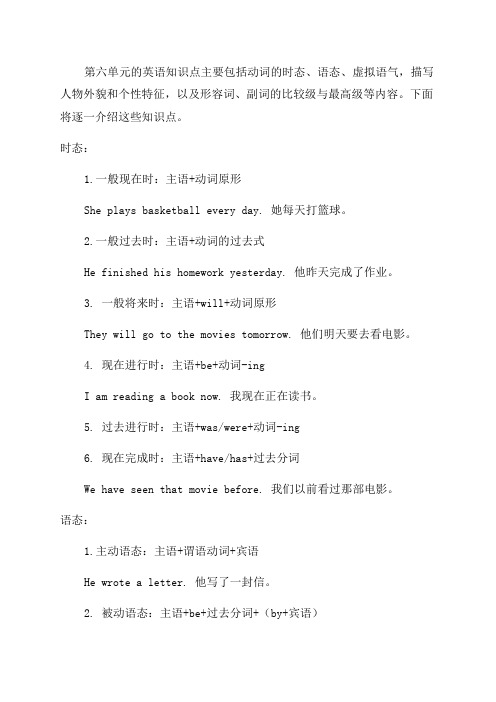
第六单元的英语知识点主要包括动词的时态、语态、虚拟语气,描写人物外貌和个性特征,以及形容词、副词的比较级与最高级等内容。
下面将逐一介绍这些知识点。
时态:1.一般现在时:主语+动词原形She plays basketball every day. 她每天打篮球。
2.一般过去时:主语+动词的过去式He finished his homework yesterday. 他昨天完成了作业。
3. 一般将来时:主语+will+动词原形They will go to the movies tomorrow. 他们明天要去看电影。
4. 现在进行时:主语+be+动词-ingI am reading a book now. 我现在正在读书。
5. 过去进行时:主语+was/were+动词-ing6. 现在完成时:主语+have/has+过去分词We have seen that movie before. 我们以前看过那部电影。
语态:1.主动语态:主语+谓语动词+宾语He wrote a letter. 他写了一封信。
2. 被动语态:主语+be+过去分词+(by+宾语)The letter was written by him. 这封信是他写的。
虚拟语气:1. 虚拟语气表示与事实相反的情况,一般使用"would/could/should+动词原形"构成。
If I were you, I would study harder. 如果我是你,我会更努力学习。
描写人物外貌和个性特征:1. 外貌描述:高(high)、中等身高(medium height)、矮(short)、肥胖(fat)、苗条(thin)、长发(long hair)、短发(short hair)、直发(straight hair)、卷发(curly hair)等。
She is tall and slim with long curly hair. 她个子高高的,苗条,长着一头卷发。
Unit6笔记人教版英语九年级全册
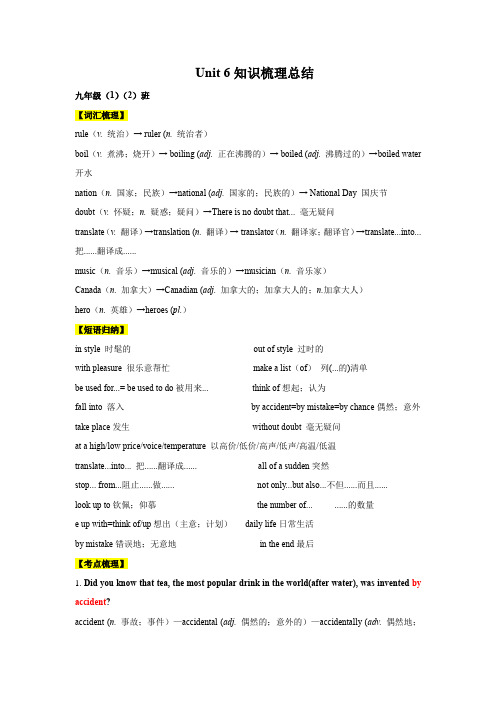
Unit 6知识梳理总结九年级(1)(2)班【词汇梳理】rule(v.统治)→ ruler (n. 统治者)boil(v.煮沸;烧开)→ boiling (adj. 正在沸腾的)→ boiled (adj. 沸腾过的)→boiled water 开水nation(n.国家;民族)→national (adj. 国家的;民族的)→ National Day 国庆节doubt(v.怀疑;n.疑惑;疑问)→There is no doubt that... 毫无疑问translate(v.翻译)→translation (n. 翻译)→ translator(n.翻译家;翻译官)→translate...into...把......翻译成......music(n.音乐)→musical (adj. 音乐的)→musician(n.音乐家)Canada(n.加拿大)→Canadian (adj. 加拿大的;加拿大人的;n.加拿大人)hero(n.英雄)→heroes (pl.)【短语归纳】in style 时髦的out of style 过时的with pleasure 很乐意帮忙make a list(of)列(...的)清单be used for...= be used to do被用来... think of想起;认为fall into 落入by accident=by mistake=by chance偶然;意外take place发生without doubt 毫无疑问at a high/low price/voice/temperature 以高价/低价/高声/低声/高温/低温translate...into... 把......翻译成...... all of a sudden突然stop... from...阻止......做...... not only...but also...不但......而且......look up to钦佩;仰慕the number of... ......的数量e up with=think of/up想出(主意;计划)daily life日常生活by mistake错误地;无意地in the end最后【考点梳理】1.Did you know that tea, the most popular drink in the world(after water), was invented by accident?accident (n.事故;事件)—accidental (adj.偶然的;意外的)—accidentally (adv.偶然地;意外地)by accident=by chance偶然;意外e.g. Please be careful, or you will have a car accident.This piece of music was invented by accident.2.It is said that a Chinese ruler called Shen Nong was the first to discover tea as a drink. It is said that... 据说......(It是形式主语,that从句是真正主语)It is believed that... 人们认为...It is reported that... 据报道...3.It produced a nice smell so he tasted the brown water.smell n. 气味;v.发出......气味;闻到①作可数名词,意为“气味”。
洛阳市九年级英语全册Unit6Whenwasitinvented重点归纳笔记
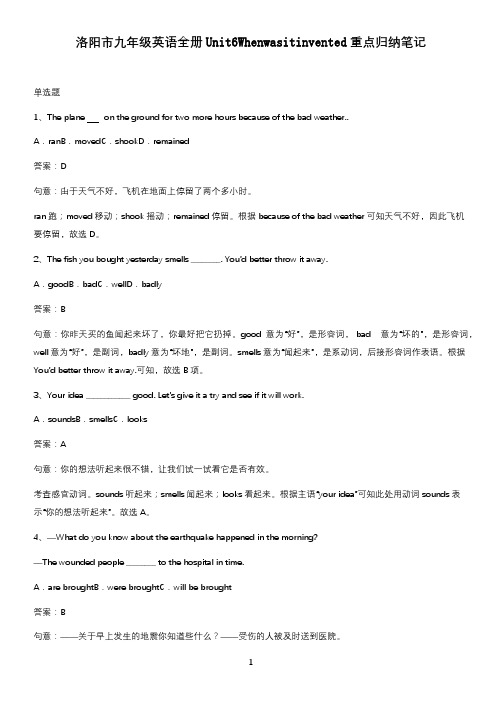
洛阳市九年级英语全册Unit6Whenwasitinvented重点归纳笔记单选题1、The plane on the ground for two more hours because of the bad weather.. A.ranB.movedC.shookD.remained答案:D句意:由于天气不好,飞机在地面上停留了两个多小时。
ran跑;moved移动;shook摇动;remained停留。
根据because of the bad weather可知天气不好,因此飞机要停留,故选D。
2、The fish you bought yesterday smells ________. You’d better throw it away. A.goodB.badC.wellD.badly答案:B句意:你昨天买的鱼闻起来坏了,你最好把它扔掉。
good意为“好”,是形容词, bad 意为“坏的”,是形容词,well意为“好”,是副词,badly意为“坏地”,是副词。
smells意为“闻起来”,是系动词,后接形容词作表语。
根据You’d better throw it away.可知,故选B项。
3、Your idea ____________ good. Let's give it a try and see if it will work.A.soundsB.smellsC.looks答案:A句意:你的想法听起来很不错,让我们试一试看它是否有效。
考查感官动词。
sounds听起来;smells闻起来;looks看起来。
根据主语“your idea”可知此处用动词sounds表示“你的想法听起来”。
故选A。
4、—What do you know about the earthquake happened in the morning?—The wounded people ________ to the hospital in time.A.are broughtB.were broughtC.will be brought答案:B句意:——关于早上发生的地震你知道些什么?——受伤的人被及时送到医院。
人教版九年级unit6知识点
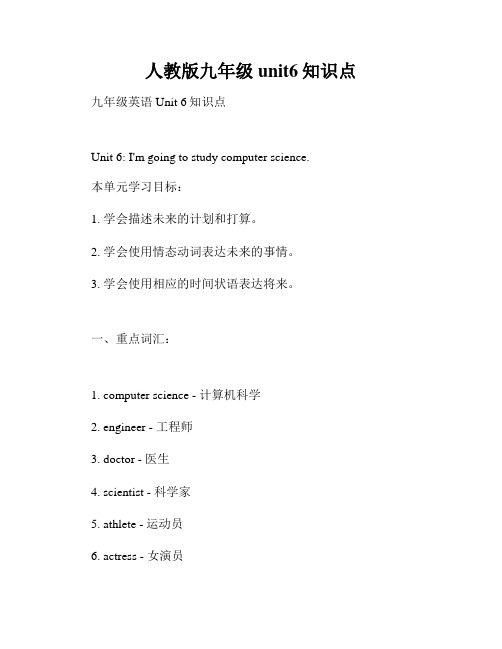
人教版九年级unit6知识点九年级英语Unit 6知识点Unit 6: I'm going to study computer science.本单元学习目标:1. 学会描述未来的计划和打算。
2. 学会使用情态动词表达未来的事情。
3. 学会使用相应的时间状语表达将来。
一、重点词汇:1. computer science - 计算机科学2. engineer - 工程师3. doctor - 医生4. scientist - 科学家5. athlete - 运动员6. actress - 女演员7. future - 将来,未来的8. plan - 计划9. university - 大学10. college - 学院,大学11. career - 职业12. job - 工作13. study - 学习二、重点句型:1. What are you going to do in the future? - 你将来要做什么?2. I'm going to be a computer scientist. - 我将成为一名计算机科学家。
3. Are you going to study at university? - 你打算上大学吗?4. Yes, I'm going to study computer science at university. - 是的,我打算在大学学习计算机科学。
三、重点语法:1. 情态动词be going to的用法。
用于表示未来的计划和打算,后接动词原形。
例如:- I'm going to travel to Paris next summer.(我下个夏天要去巴黎旅游。
)- He is going to study medicine at Oxford University.(他打算在牛津大学学医。
)2. 时间状语的使用。
常用时间状语有next week, next month, next year等。
英语九年级六单元知识点

英语九年级六单元知识点一、动词时态1. 一般现在时:表示经常性、习惯性的动作或状态。
例句:I often go swimming on weekends.2. 一般过去时:表示过去某个时间发生的事情。
例句:He watched a movie last night.3. 一般将来时:表示将来某个时间会发生的事情。
例句:They will visit their grandparents next week.4. 现在进行时:表示现在正在进行的动作。
例句:She is reading a book at the moment.5. 过去进行时:表示过去某个时间正在进行的动作。
例句:We were playing soccer when it started to rain.6. 现在完成时:表示已经完成的动作对现在造成的影响。
例句:He has already finished his homework.7. 过去完成时:表示在过去某个时间之前已经完成的动作。
例句:By the time she arrived, they had already left.二、被动语态被动语态的构成:助动词be + 过去分词。
1. 一般现在时的被动语态:am/is/are + 过去分词。
例句:The book is read by me.2. 一般过去时的被动语态:was/were + 过去分词。
例句:The movie was watched by them last night.3. 一般将来时的被动语态:will be + 过去分词。
例句:The report will be delivered by him tomorrow.4. 现在进行时的被动语态:am/is/are being + 过去分词。
例句:The house is being cleaned by the maids.5. 现在完成时的被动语态:have/has been + 过去分词。
九年级上册英语第6单元笔记

九年级上册英语第6单元笔记一、重点短语1. used to do 过去常常做某事2. be used to doing sth 习惯做某事3. be used for 被用来做某事4. be used as 被当作……使用5. the opposite of …的相反词6. in the opposite way 以相反的方式7. in the same way 以同样的方式8. in the past 在过去9. most of the time 大部分时间10. at the beginning of 在……开始的时候11. at the end of 在……结束的时候12. make sb do sth 让某人做某事13. feel sb doing sth 感觉到某人正在做某事14. sound like 听起来像15. in the future 在将来16. be different from 与……不同17. in one’s opinion 在某人看来18. according to 根据19. no longer 不再20. not…any more 不再21. as well 也,又,同样地22. in the same way 用同样的方式23. go to sleep 入睡24. wake up 醒来,叫醒25. turn off 关掉(电器)26. take off 起飞,脱下,取消,移除,让……休息27. fall asleep 入睡,睡着28. be asleep 在睡着的状态中(表状态)29. go to bed 上床睡觉,就寝(表动作)30. get up 起床(表动作)31. stay up 熬夜,不睡觉,坚持,保持(表状态)32. all the time 一直,始终,屡屡(置于动词、形容词、副词之后)33. on time 按时,准时。
副词形式:时间处于合适的时间点;介词形式:某事处于合适的时间点。
九年级英语unit6-10笔记整理

Unit 61.such a great invention 如此好的发明such +a/an +adj+名词2.daily life 日常生活3.by accident 偶然的4. have a point 有道理5. It is said that 据说It is believed that 人们相信6.fall into落入,陷入It is reported that 据报道7.stop …from 阻止…做某事7.some time ; sometime; some times ; sometimes 区别sometimes表示“有时” Sometimes I get up at six. 我有时6点起床sometime表示“某个时候” We will have a meeting sometime next week 我们下周某个时候有个会。
some time表示一段时间egIt took us some time to water the flowers. 浇花花了我一段时间。
some times意为“几次,I met him some times in the street last month. 我上个月在街上见了他几次。
8.not …until 直到…才eg :I didn’t sleep until my mother came back .9.take place /happen 发生无被动语态10.without doubt 毫无疑问,的确11.the popularity of tea 茶的普及12.tea culture 茶文化13.in the end 最后14.translate …into把…翻译成Please translate Chinese into English .请把汉语翻译成英语15. all of the sudden 突然16.at the same time 同时17.by mistake 错误地I took your book by mistake. 我拿错你的书。
英语九年级上册unit 6单元知识点总结
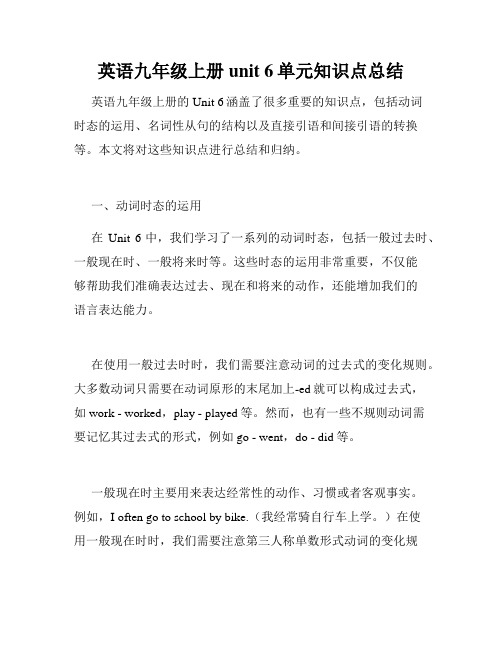
英语九年级上册unit 6单元知识点总结英语九年级上册的Unit 6涵盖了很多重要的知识点,包括动词时态的运用、名词性从句的结构以及直接引语和间接引语的转换等。
本文将对这些知识点进行总结和归纳。
一、动词时态的运用在Unit 6中,我们学习了一系列的动词时态,包括一般过去时、一般现在时、一般将来时等。
这些时态的运用非常重要,不仅能够帮助我们准确表达过去、现在和将来的动作,还能增加我们的语言表达能力。
在使用一般过去时时,我们需要注意动词的过去式的变化规则。
大多数动词只需要在动词原形的末尾加上-ed就可以构成过去式,如work - worked,play - played等。
然而,也有一些不规则动词需要记忆其过去式的形式,例如go - went,do - did等。
一般现在时主要用来表达经常性的动作、习惯或者客观事实。
例如,I often go to school by bike.(我经常骑自行车上学。
)在使用一般现在时时,我们需要注意第三人称单数形式动词的变化规则,即在动词原形的末尾加上-s或者-es,如run - runs,watch - watches等。
一般将来时由助动词will和动词原形构成,主要用来表示将要发生的动作或者计划中的事情。
例如,I will visit my grandparents tomorrow.(我明天要去看望我的祖父母。
)在使用一般将来时时,我们还需要注意其他一些表示将来的词语,如tomorrow(明天)、next week(下周)等。
二、名词性从句的结构名词性从句是一个由连接词(引导词)引导的句子,起名词的作用。
在Unit 6中,我们学习了几种常用的引导词,如that, what, who, which等。
名词性从句可以用作主语、宾语、表语或者补足语。
例如,What he said surprised me.(他说的话让我感到惊讶。
)在这个例句中,名词性从句“What he said”作为宾语出现。
九年级英语第六单元笔记

01 Unit Theme and Background
Theme Introduction
The unit theme focuses on exploring the concept of "cultural diversity" and how it shapes our understanding of the world
A Pandora's box
something that has both advantages and disadvantages; A mixed mixing
a source of many unexpected and oft troublesome problems
Examples of vocabulary usage
• Methodology: A figure of speech in which a word or phrase is applied to an object or action to which it is not Literally applicable
• Iron: A literary technique used to create a contrast between what is said and what is mean, both for humorus or empirical effect
+I___(Study) the test yesterday
for since
Grammar and presence pattern exercises
Change the following intentions into passive voice
2024九年级英语上册Unit6必背知识点

2024九年级英语上册Unit6 When was itinvented?必背知识点针对2024年九年级英语上册Unit6 "When was it invented?"的必背知识点,可以归纳如下:一、重点短语1. It's my pleasure./ My pleasure. 我的荣幸。
2. seem+to+动词原形好像做某事。
3. such a great invention 如此伟大的一项发明。
4. think of = think about 想到,考虑。
5. in our daily lives/ in my daily life 在我们的日常生活中/在我的日常生活中。
6. have a point 有道理。
7. by accident 偶然地,意外地。
8. over an open fire 在篝火上。
9. It is said that 据说。
10. It is believed that 人们相信。
11. fall into = drop into 掉进……。
12. in the 19th century 在19世纪。
13. spread to other countries 传播到其他国家。
14. at a low price 以很低的价格。
15. bring sth. to sp. 把某物带到某处。
16. all of a sudden 突然地。
17. less than 少于,不到;more than = over 超过。
18. without doubt 毫无疑问。
19. at that time 在那时。
20. advise sb. (not) to do sth. 建议某人(不要)做某事。
21. start doing sth. 开始做某事。
22. work on sth. 致力于某事。
23. (be) similar to 与……相似。
24. the Olympics 奥运会。
九年级英语笔记unit6
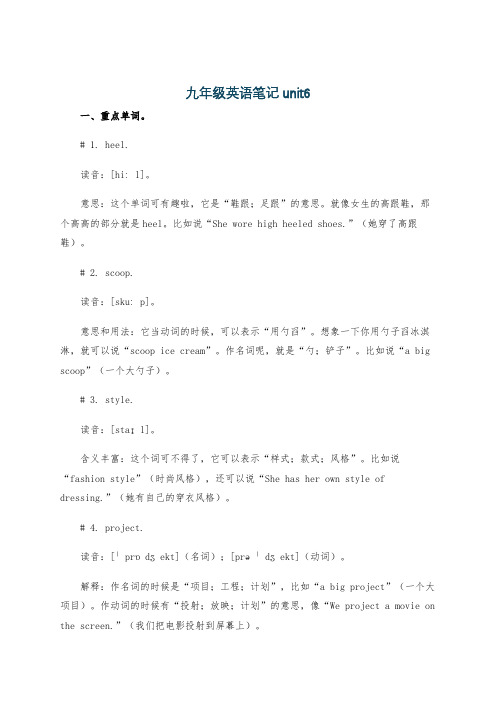
九年级英语笔记unit6一、重点单词。
# 1. heel.读音:[hiːl]。
意思:这个单词可有趣啦,它是“鞋跟;足跟”的意思。
就像女生的高跟鞋,那个高高的部分就是heel。
比如说“She wore high heeled shoes.”(她穿了高跟鞋)。
# 2. scoop.读音:[skuːp]。
意思和用法:它当动词的时候,可以表示“用勺舀”。
想象一下你用勺子舀冰淇淋,就可以说“scoop ice cream”。
作名词呢,就是“勺;铲子”。
比如说“a big scoop”(一个大勺子)。
# 3. style.读音:[staɪl]。
含义丰富:这个词可不得了,它可以表示“样式;款式;风格”。
比如说“fashion style”(时尚风格),还可以说“She has her own style of dressing.”(她有自己的穿衣风格)。
# 4. project.读音:[ˈprɒdʒekt](名词);[prəˈdʒekt](动词)。
解释:作名词的时候是“项目;工程;计划”,比如“a big project”(一个大项目)。
作动词的时候有“投射;放映;计划”的意思,像“We project a movie on the screen.”(我们把电影投射到屏幕上)。
二、重点短语。
# 1. be used for.用法:这个短语表示“被用于……”,它后面要接名词或者动名词(V ing形式)。
例如“Knives are used for cutting things.”(刀被用于切东西)。
这里要注意和“be used to do”(被用来做某事,和be used for意思相近,但是用法上后面接动词原形)以及“be used to doing”(习惯于做某事)区分开哦。
我给你个小口诀:“for加名或动名,to do原形要记清,to doing习惯成”。
# 2. by accident.意思和例句:“偶然;意外地”。
Unit6知识点人教版九年级英语全册
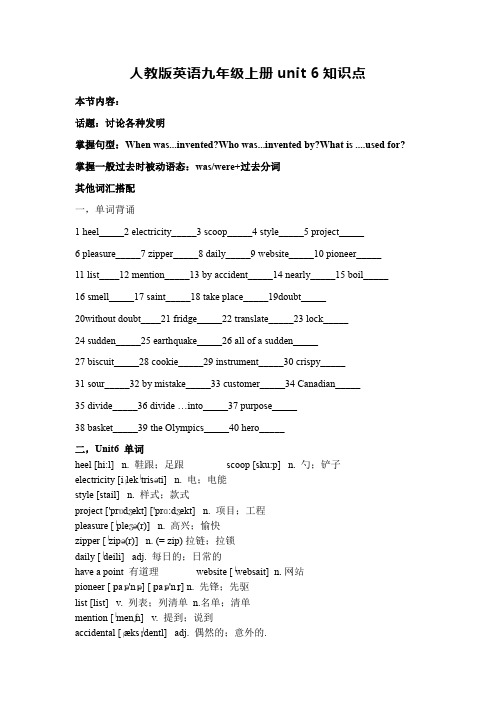
人教版英语九年级上册unit 6知识点本节内容:话题:讨论各种发明掌握句型:When was...invented?Who was...invented by?What is ed for?掌握一般过去时被动语态:was/were+过去分词其他词汇搭配一,单词背诵1heel_____2electricity_____3scoop_____4style_____5project_____6pleasure_____7zipper_____8daily_____9website_____10pioneer_____11list____12mention_____13by accident_____14nearly_____15boil_____16smell_____17saint_____18take place_____19doubt_____20without doubt____21fridge_____22translate_____23lock_____24sudden_____25earthquake_____26all of a sudden_____27biscuit_____28cookie_____29instrument_____30crispy_____31sour_____32by mistake_____33customer_____34Canadian_____35divide_____36divide …into_____37purpose_____38basket_____39the Olympics_____40hero_____二,Unit6 单词heel [hi:l]n. 鞋跟;足跟scoop [sku:p]n. 勺;铲子electricity [iˌlekˈtrisəti]n. 电;电能style [stail]n. 样式;款式project ['prɒdʒekt]['prɑ:dʒekt]n. 项目;工程pleasure [ˈpleʒə(r)]n. 高兴;愉快zipper [ˈzipə(r)]n. (= zip)拉链;拉锁daily [ˈdeili]adj. 每日的;日常的have a point有道理website[ˈwebsait]n.网站pioneer [ˌpaɪə'nɪə][ˌpaɪə'nɪr] n. 先锋;先驱list [list]v. 列表;列清单n.名单;清单mention [ˈmenʃn]v. 提到;说到accidental [ˌæksɪˈdentl]adj. 偶然的;意外的.by accident 偶然;意外地ruler [ˈru:lər]n. 统治者;支配者boil [bɔil]v. 煮沸;烧开remain [rɪˈmeɪn]v. 保持不变;剩余smell [smel]v.(smelt[]smelt,smelled[] smelled)发出……气味;闻到saint[seint]n. 圣人;圣徒national ['næʃnəl]adj. 民族的;国家的;trade[treɪd]n.贸易;交易;v.做买卖;从事贸易;take place 发生;出现popularity[pɒpjʊ'lærətɪ]n.受欢迎,普及,doubt [daut]n. 疑惑;疑问v. 怀疑without doubt 毫无疑问;的确.fridge[fridʒ]n.冰箱.low [loʊ]adj. 低的;矮的somebody['sʌmbədi]pron.某人n.重要人物translate[trænsˈleit]v.翻译.lock [lɔk][la:k]v. 锁上;锁住n.锁ring [rɪŋ]v.(rang,rung)发出钟声或铃声;打earthquake[ˈʒ:(r)θkweik]n.地震.udden[ˈsʌdən]adj.突然(的).all of a sudden 突然;猛地.bell [bel]n.钟(声);铃(声)biscuit[ˈbiskit]n.饼干.cookie[ˈkuki]n.曲奇饼干.musical [ˈmju:zɪkl]adj. 音乐的;有音乐天赋的instrument [ˈinstrumənt]n. 器械;仪器;工具.crispy [ˈkrispi]adj. 脆的;酥脆的.salty[ˈsɔ:lti]adj.咸的sour [ˈsauə(r)]adj. 酸的;有酸味的.mistake 错误地;无意中customer [ˈkʌstəmə(r)]n. 顾客;客户.the Olympics[əˈlimpiks]奥林匹克运动会.Canadian [kəˈneidiən]adj. 加拿大的;加拿大人的n.加拿大人. divide [diˈvaid]v. 分开;分散.divide...into把……分开.basket [ba:ski[]n. 篮;筐.not only...but also...不但……而且……look up to 钦佩;仰慕hero [ˈhiərəu]n. 英雄;男主角Professional [prəˈfeʃənl] adj.职业的;专业的Berlin[bə:lin]柏林(德国城市).NBA(National Basketball Association)国家篮球协会(美国职业篮球联赛). CBA(China Basketball Association)中国篮球协会(中国职业篮球联赛). Roy n.罗伊(男子名)Whitb[ˈwitkəm]Judson[ˈdʒʌdsən]惠特科姆•贾德森.Ruby[ˈru:bi]鲁比(人名)Thomas[ˈtɔməs]Watson[ˈwɔtsən]托马斯•沃森George[dʒɔ:(r)dʒ]Crum[krʌm]乔治•克拉姆James[dʒeimz]Naismith[ˈnaismiθ]詹姆斯•奈史密斯三,【重点短语】1.It's my pleasure.= My pleasure.我的荣幸2.seem+to+动词原形好像做某事3.such a great invention 如此伟大的一项发明4.think of = think about 想到,考虑5.in our daily lives 在我们的日常生活中6.in my daily life在我的日常生活中7.have a point 有道理8.by accident 偶然地,意外地9.over an open fire 在篝火上10.It is said that据说11.It is believed that人们相信12.fall into(过去式fell into)=drop into掉进…13.in the 19th century 在19世纪14.spread to other countries 传播到其他国家15.at a low price 以很低的价格17.all of a sudden 突然地18.less than少于,不到more than = over 超过19.without doubt 毫无疑问20.at that time 在那时21.advise sb (not) to do sth建议某人(不要)做某事22.start doing sth 开始做某事23.work on sth 致力于某事24.(be) similar to 与……相似25.the Olympics 奥运会26.by mistake 错误地,无意地27.make a mistake 犯错28.divide ...into…把…分成…29.in the end = at last = finally 最后30.at the same time 同时【重点句型】1.give sth. to sb.I gave a pen to him. 我给他一支笔。
九年级英语Unit6笔记
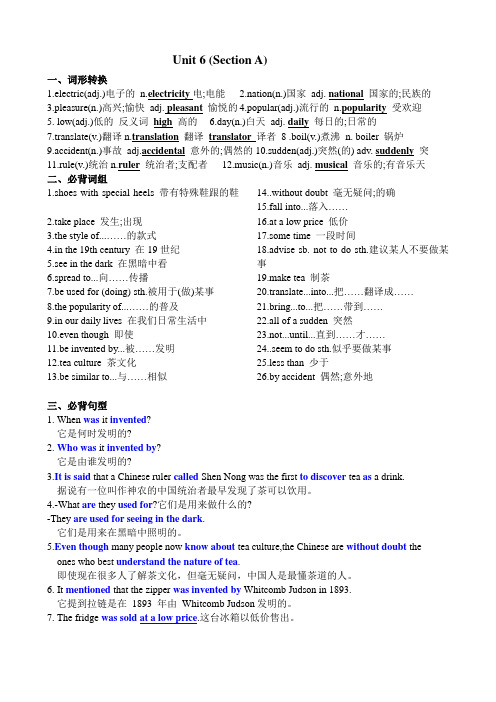
Unit 6 (Section A)一、词形转换1.electric(adj.)电子的n.electricity电;电能2.nation(n.)国家adj. national国家的;民族的3.pleasure(n.)高兴;愉快adj. pleasant愉悦的4.popular(adj.)流行的n.popularity受欢迎5. low(adj.)低的反义词high高的6.day(n.)白天adj. daily每日的;日常的7.translate(v.)翻译n.translation翻译translator 译者8 .boil(v.)煮沸n. boiler 锅炉9.accident(n.)事故adj.accidental意外的;偶然的10.sudden(adj.)突然(的) adv. suddenly突11.rule(v.)统治n.ruler统治者;支配者12.music(n.)音乐adj. musical音乐的;有音乐天二、必背词组1.shoes with special heels 带有特殊鞋跟的鞋2.take place 发生;出现3.the style of...……的款式4.in the 19th century 在19世纪5.see in the dark 在黑暗中看6.spread to...向……传播7.be used for (doing) sth.被用于(做)某事8.the popularity of...……的普及9.in our daily lives 在我们日常生活中10.even though 即使11.be invented by...被……发明12.tea culture 茶文化13.be similar to...与……相似14..without doubt 毫无疑问;的确15.fall into...落入……16.at a low price 低价17.some time 一段时间18.advise sb. not to do sth.建议某人不要做某事19.make tea 制茶20.translate...into...把……翻译成……21.bring...to...把……带到……22.all of a sudden 突然23.not...until...直到……才……24..seem to do sth.似乎要做某事25.less than 少于26.by accident 偶然;意外地三、必背句型1. When was it invented?它是何时发明的?2. Who was it invented by?它是由谁发明的?3.It is said that a Chinese ruler called Shen Nong was the first to discover tea as a drink.据说有一位叫作神农的中国统治者最早发现了茶可以饮用。
九年级英语6单元笔记
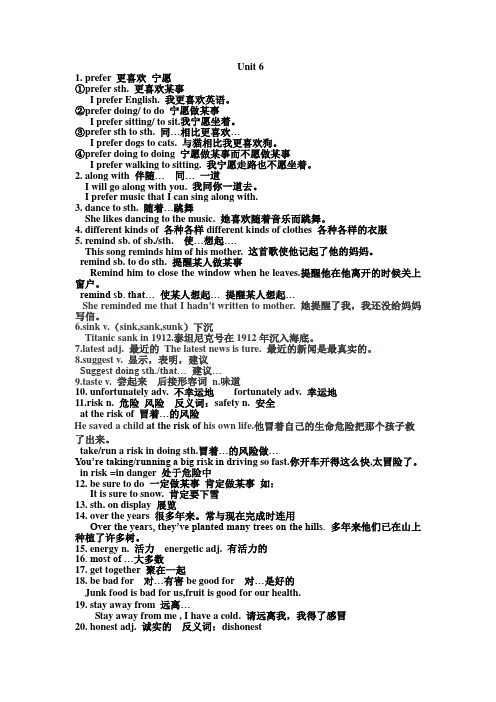
Unit 61. prefer 更喜欢宁愿①prefer sth. 更喜欢某事I prefer English. 我更喜欢英语。
②prefer doing/ to do 宁愿做某事I prefer sitting/ to sit.我宁愿坐着。
③prefer sth to sth. 同…相比更喜欢…I prefer dogs to cats. 与猫相比我更喜欢狗。
④prefer doing to doing 宁愿做某事而不愿做某事I prefer walking to sitting. 我宁愿走路也不愿坐着。
2. along with 伴随… 同… 一道I will go along with you. 我同你一道去。
I prefer music that I can sing along with.3. dance to sth. 随着…跳舞She likes dancing to the music. 她喜欢随着音乐而跳舞。
4. different kinds of 各种各样different kinds of clothes 各种各样的衣服5. remind sb. of sb./sth. 使…想起….This song reminds him of his mother. 这首歌使他记起了他的妈妈。
remind sb. to do sth. 提醒某人做某事Remind him to close the window when he leaves.提醒他在他离开的时候关上窗户。
remind sb. that… 使某人想起… 提醒某人想起…She reminded me that I hadn't written to mother. 她提醒了我,我还没给妈妈写信。
6.sink v.(sink,sank,sunk)下沉Titanic sank in 1912.泰坦尼克号在1912年沉入海底。
九年级英语第六单元笔记

I always believe whatever he says. 我总是相信他说的任何话。
5. Over the years, we’ve seen musical groups with pretty strange names come and go.
Unit 6 I like music that I can dance to.
The attributive clauses
在复合句中修饰名词或代词的从 句叫定语从句。
主格 宾格 所有格
指代人 who that
whom/who whose that
指代物 which which that that
prefer是及物动词,意为“更喜欢,更喜 爱”,相当于like ... better。其用法如下: 1) prefer sth.意为“更喜欢……”。例如:
My grandma preferred country life when
she was old. 我奶奶老了以后更喜欢乡村生活。 2) prefer doing / to do sth.意为“更喜欢 干……”。例如:
4. I prefer a sandwich that(主语)
is really delicious. Who/that 在定语从句中作主语时,
谓语动词的单复数与先行词保持一 致。 e. g. I prefer shoes that are cool.
I have a friend who plays sports.
bike; he didn’t, though. 他说他要借给我自行车,可是他没有。
- 1、下载文档前请自行甄别文档内容的完整性,平台不提供额外的编辑、内容补充、找答案等附加服务。
- 2、"仅部分预览"的文档,不可在线预览部分如存在完整性等问题,可反馈申请退款(可完整预览的文档不适用该条件!)。
- 3、如文档侵犯您的权益,请联系客服反馈,我们会尽快为您处理(人工客服工作时间:9:00-18:30)。
yesterday’s competition. 张军的确在昨天的竞赛中赢得了第
一名。2) though (1 adv. 副词放在句末,前面常用逗号隔开,意为 “可是,不过,然而”。 例如:He said he would lend me his
e.g. It is sure to rain. 肯定要下雨。 Be sure to write and tell me all your
news. 务必来信告诉我你的消息。
4. Whatever you do, don’t miss the
exhibition. 无论你干什么,都不要错过这次展览。
I prefer watching / to watch a football match. 我更喜欢看足球比赛。
3) prefer sb. to do sth.意为“宁愿某人 做……”。例如:
My mother prefers me to stay with her a
little longer. 我妈妈更喜欢我和她多呆一会儿。 4) prefer sth. to sth.意为“比起……更喜 欢……”。例如:
prefer是及物动词,意为“更喜欢,更喜 爱”,相当于like ... better。其用法如下: 1) prefer sth.意为“更喜欢……”。例如:
My grandma preferred country life when
she was old. 我奶奶老了以后更喜欢乡村生活。 2) prefer doing / to do sth.意为“更喜欢 干……”。例如:
Unit 6 I like music that I can dance to.
The attributive clauses
在复合句中修饰名词或代词的从 句叫定语从句。
主格 宾格 所有格
指代人 who that
whom/who whose that
指代物 which which that that
In his eyes, whatever I did was wrong. 在他眼里,我无论做什么都是错的。
I always believe whatever he says. 我总是相信他说的任何话。
5. Over the years, we’ve seen musical groups with pretty strange names come and go.
She prefers loud music to quiet music. 比起轻音乐来她更喜欢韵律强劲的音乐。
5) prefer doing sth. to doing sth.= prefer to do sth. rather than do sth. 意为“喜欢 做……而不喜欢做……”或“宁愿做…… 而不愿做……”。例如: Mary prefers dancing to singing. 玛丽喜欢跳舞而不喜欢唱歌。
bike; he didn’t, though. 他说他要借给我自行车,可是他没有。
(2) conj. 连词 意为“虽然,尽管”。例如:
Though he got up late, he still wanted to have a bath. 虽然他起得晚了,但他仍然想冲个澡。
3. be sure to do sth. 肯定要做某事的;一定要做某事的
6. Few have stranger names than this
band. 有几支乐队的名字比这只更奇怪. few “有一点儿”,修饰可数名词, 相当
于 few bands.
7. As the name suggests, the band has lots of energy.
正如乐队的名字所暗示的那样, 这支 乐队非常具有活力。
4. I prefer a sandwich that(主语)
is really delicious. Who/that 在定语从句中作主语时,
谓语动词的单复数与先行词保持一 致。 e. g. I prefer shoes that are cool.
I have a friend who plays sports.
多年来,我们看到许多拥有相当奇怪 名字的音乐组合在乐坛上来来往往。
see sb. do sth. 看见某人做某事, do 前面省略不定式to.
see sb. doing sth. 看见某人正在做某事 pretty strange names 相当奇怪的名字 pretty, 副词, 意思是“相当, 十分”。
1) whatever用作代词,意为“无论什么, 不管怎样”,引导让步状语从句,相当 于no matter what。例如:
Whatever happens, I will never forget
what I have said. 无论发生什么,我都不会忘记我曾经说 过的。
2) whatever 也可用来引导主语从句、宾 语从句等,此时不能用no matter what 代替。例如:
’s made = has made 为现在完成时 态
over the years 意思是“多年来”
2. It does have a few good features, though. 不过它确实有些独到之处。
1) does 在谓语动词前常可以借助于 助动词do / does / did,起加强语气的 作用。例如:
They prefer to stay at home rather than go out with their parents. 他们宁愿呆在家里而不愿和父母出去。
Explanation
1. He’s made some great movies over the years.
这些年来, 他已经拍摄了多部精彩的 影片。
Who/that 在从句中可担任主语或宾语
1. I love singers who (主语) write their
own songs.
2. He is the man who (宾语) I met
yesterday.
3. I like music that (宾语) I can dance to.
whose/of which
当关系代词在从句中作宾语时, 关系 代词可以省略。
定语从句修 饰 the man
He is the man who I met yesterday. Do you know who he is?
I prefer sandwich
定语从句修 饰sandwich
that is really delicious.
